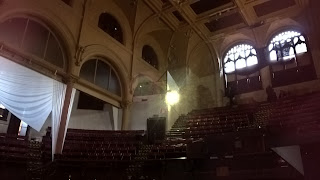Religion and Higher Education in Europe and North America
edited by Kristin Aune and Jacqueline Stevenson is a book focused primarily on
research from the UK and the USA, although as the title suggests there
are interesting chapters that look at the European context more widely and include Canada. It is
an interesting and useful interdisciplinary text which brings together the
world of Higher Education practice the sociology of religion which reflects
both the editors and contributors’ fields of specialisation.
What I particularly liked about this book is that it
contains chapters looking at a range of different faith groups and their
interaction with Higher Education. Jasjit Singh’s chapter “Samosas and simran:
university Sikh societies in Britain” gave an interesting overview of their
development and current position. As a chaplain who interacts with a range of
users of the university multi-faith centre in which I am based this gave me a
useful insight.
Similarly, Charlotte Shira Schallie’s chapter looking at
Jewish student identity and the politics of identification in Canada was useful
in giving an insight into the experiences of students from that faith. Whilst
primarily focusing on the debate within British Universities on
Israel-Palestine Ruth Sheldon’s chapter gave a complementary insight into
Jewish student identity.
These chapters came within section two of the book: “The
religious student experience: learning from qualitative studies”, which was for
me the most interesting part of the book. It also contained a paper from Aune
and Guest developing some of the material from the research study and book
Christianity and the University Experience which they were involved in.
The most enlightening chapter within this section was
Invisible Islam: Muslim student migrant’s everyday practices in French secular
universities by Anna Virkama. The portrayal of the French Secularism tends to
be stereotyped within British media and discussion as does the way it is
negotiated. This article reminded the reader that the construction of identity
and the negotiation of context is complicated and differs according to
individuals. The reductionist approach many of us take towards that situation
is shown to be reductionist by this chapter.
Qualitative research and case studies are interesting and
have much to teach us but it is also useful to examine the wider scope of the
landscape and this is what the first part of the book does, using more
quantitative methods coming from survey data.
The United States has more data available and so it is not surprising
that two of the three chapters in this part of the book focused upon them.
Jonathon P. Hill sought again to caution people against reaching reductionist
conclusions about the secularising impact of secular universities by arguing
for people to look at a wider range of variables in relation to religious
affiliation and belief by students. This chapter adds a useful new piece to the
pile of material relating to the secularisation debate.
This common theme of “it’s complicated and varied” was
echoed by Paul Weller and Tristram Hooley looking at How religion or belief
frame participation and access in UK higher education. The argument they gives
argues that with regard to the core concerns of education, retention and achievement
/ teaching and learning / the university experience religion is important and
there should be far more data being gathered, analysed and acted upon in
relation to it.
This argument that much more notice should be taken of
religion in relation to the policies and planning of universities is taken up
in the final third of the book “The place of policies, structures and curricula”.
This chapter focused more upon the UK and Europe and dealt explicitly with some
of the issues which come out of us living in the era of PREVENT and the events
which are argued to have made it necessary.
The chapter by Sariya Cheruvalli-Contractor and Alison
Scott-Baumann about Islamic Studies in UK universities: challenging the
curricula did this more implicitly than other papers in this chapter. They
looked at the way many courses still have their roots in Orientalism and the
way in which the courses need to update themselves to deal with the lived
experience of Muslims and Muslim young people today. This goes back to the
earlier themes this book dealt with so well, the importance in recognising the
diversity of religious identities and negotiation of context. This theme is
further underlined by Joke van Saane who looks at “the role of religion and
personal life orientation in curriculum development processes within the domain
of religious studies”.
Adam Dinham’s chapter calls loudly for higher education
institutions (HEI’s) and society more broadly to deal with the urgent need for
an increase in religious literacy. This call coming loudly from within
practical theology and the sociology of religion community and beyond is one which
we need to take seriously. Doing this would enable HEI’s and others to do what
Duna Sabri is calling for when she talks of the need for us to take the
religion part of the 2010 Equality Act as seriously as we do other parts.
The conclusion and overall recommendations coming from this
text come within the introductory chapter from Stevenson and Aune where they
give 12 practical recommendations about how HEI’s could move further towards
being “religiously inclusive”.
Is this book worth getting hold of? Yes, most definitely, if
you have any kind of role in planning, policy formation or teaching and
learning within universities or are involved in HE Chaplaincy work. It is a
unique book which was published as part of the Society for Research into HigherEducation (SRHE) series. The breadth of the book, the multi-faith contributions
and the fact it is the most contemporary text available with a range of contributions
from top researchers in the field make it, I would argue, an indispensable text
for those currently seeking to develop medium term plans in the current HEI
context with all its shifting sands.
























